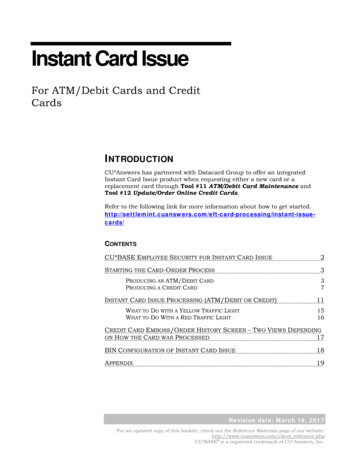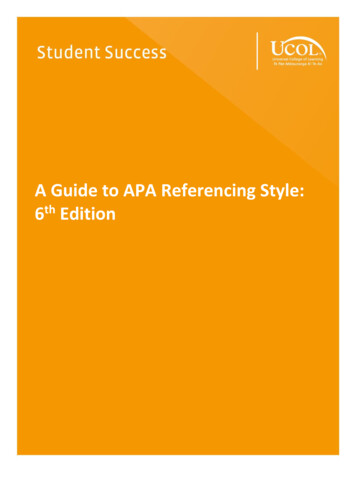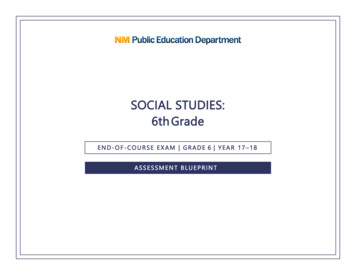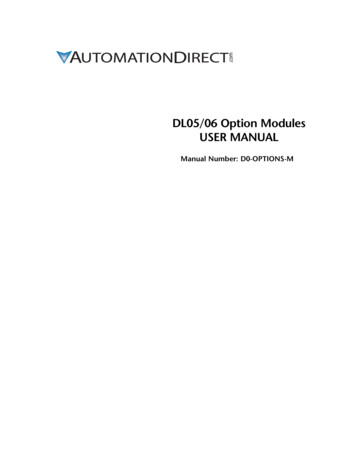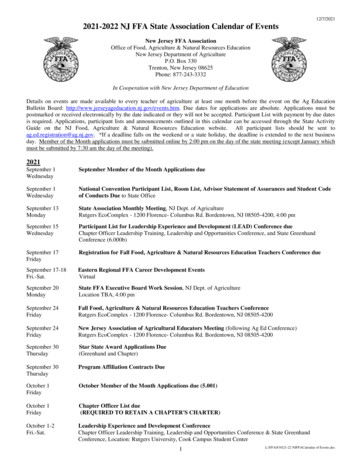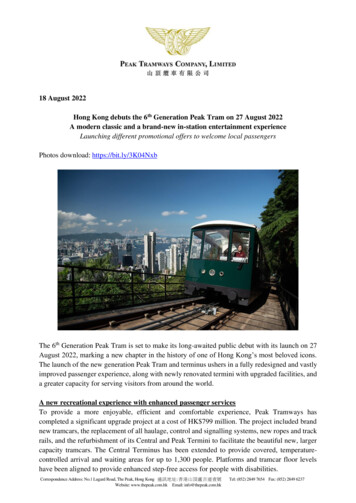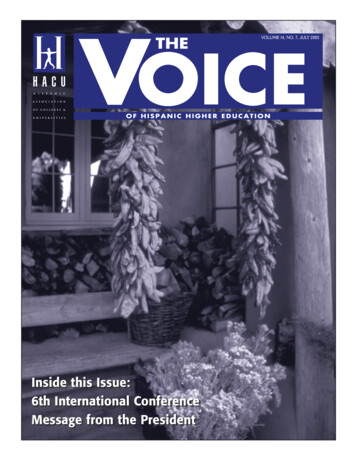
Transcription
VOLUME 14, NO. 7, JULY 2005Inside this Issue:6th International ConferenceMessage from the President
Students at HACU member SpringfieldTechnical Community College will be thefirst in a Massachusetts public college tohave the opportunity to enroll in a degreeprogram in Architectural Technology.Beginning in September, the new programwill be an associate degree option in CivilEngineering Technology and was createddue to strong demand from students inthe Architectural Technology one-yearcertificate program. The focus of the newprogram, says Architectural TechnologyProgram Coordinator Warren Hall, is toprepare the student to transfer to a four- orfive-year program to complete a bachelor’sdegree. “Professional degree programs atthe Boston Architectural Center and thefour-year program at the University ofMassachusetts at Amherst are alreadylooking forward to applications from ourstudents. In fact, we have establisheda joint admission agreement with theseinstitutions, so that students accepted intothis program at STCC are automaticallyguaranteed acceptance at the other twoinstitutions, moving directly into the thirdyear of those programs if they maintaina specified grade level here.” For moreinformation visit www.stcc.edu.July 2005Next year a group of California StateUniversity, Northridge (CSUN), studentswill be able to concentrate less on personalfinances and more on their studiesthanks to more than 65,000 awardedby CSUN’s College of Engineering andComputer Science to its students. The51 scholarships, which are derived fromscholarship endowments and annual gifts,will be awarded to 30 students duringFall 2005 and Spring 2006 semesters.“These students are the role models for thecollege with all of them making excellentprogress toward their degree goals,” saidJ. Michael Kabo, associate dean of thecollege. “The scholarships provide uswith great opportunity to recognize theaccomplishments of our students.”St. Mary’s University will send a schoolrecord of nine undergraduate students tothe eight-week McNair Scholars Programat the University of Notre Dame beginningJune 12, to advance their aspirations forearning a doctoral degree. The goal ofthe summer research internship is tohelp relatively disadvantaged minoritystudents or first generation college studentsprepare to complete their baccalaureatedegree, enter graduate school and obtain adoctorate through involvement in researchand other scholarly activities. St. Mary’scontingent includes: Kiran Bains, MarisaXimenez, Yesenia Bernal, Luis Garcia,Christina Gonzalez, Isabel Rodriguez,Christopher Villa, Agueda Balderrama andCarshena Jones.New college graduates looking for theirfirst career position can greatly boost theirchances of landing a job simply by takingthe time to research the company before theinterview, according to a study conductedby the National Association of Collegesand Employers (NACE).Employersparticipating in NACE’s Job Outlook 2005survey cited research as a key ingredient toa successful job search. “Researching thecompany before the interview is perhapsthe single most important step for a newgraduate to take to stand out from others,”says Marilyn Mackes, NACU executivedirector. Job candidates who take the timeto research in advance of the interview arebetter prepared, according to Mackes.St. Augustine College is proud to announcethat it recently received a four-yearStudent Support Services (SSS) grantin the amount of more than 1,000,000from the U.S. Department of Education,Office of Postsecondary Education. SSS, aswell as other Federal TRIO grants, is aneducational outreach program designed tohelp low-income, first generation studentsin graduating and transferring from College.During the grant cycle, the SSS programwill select eligible students whose needsfor support services will be addressed byproviding additional instruction in EnglishComposition I, tutoring, academic andcareer advising, institutional and federalfunds to supplement the students’ financialaid packages and transfer services, justto mention a few. The program’s mostsignificant expected goal is to graduateand transfer 60% of its participants withinthree years.Lydell Lichtenberg, a senior at DadeChristian School, will receive a 15,000renewable scholarship for four yearsof attendance beginning this fall at St.Thomas University as long as a 2.5 GPA ismaintained. The University held an openscholarship competition for high achievingundergraduate students for classesbeginning in the Fall of 2005. Lydell is amember of the National Honor Society,Future Business Leaders of Americaand HOST. He is a life-long resident ofMiami, Florida and will enter St. ThomasUniversity this fall as a freshmanand plans to major in computer scienceor engineering.Pg. 3 Message from the PresidentPg. 4 Notes from Washington D.C.Pg. 5–7 6th International ConferencePg. 8 Student Health CarePg. 9 Southwest AirlinesHACU’s 6th International Conferencein Santa Fe, New Mexico, was agreat success. Please see page 5 forhighlights.HACU’s 19th Annual ConferenceOctober 15 – 18, 2005 Phoenix, ArizonaHACU National Headquarters8415 Datapoint Drive, Suite 400San Antonio, Texas, 78229Tel: (210) 692-3805. Fax: (210) 692-0823Web site: www.hacu.netE-mail: hacu@hacu.netHACU President: Antonio FloresHACU Washington D.C. OfficeOne Dupont Circle, Suite 605Washington, D.C. 20036Tel: (202) 833-8361. Fax: (202) 261-5082E-mail: govrel@hacu.netHACU Vice President, GovernmentRelations: Gumecindo SalasHACU National Internship ProgramOne Dupont Circle N.W., Suite 605Washington D.C. 20036Tel: (202) 467-0893. Fax: (202) 496-9177E-mail: hnip@hacu.netHNIP Director: Sandra PeñaherreraTo Advertise in The VoiceContact: Cynthia VelaTel: (210) 692-3805 Ext. 129Fax: (210) 692-0823E-mail: cvela@hacu.net
GLOBAL AGENDAFOR HISPANICHIGHER EDUCATIONBy Antonio R. Flores President and CEO of HACUHThe Hispanic Association of Colleges and Universitiesrepresents more than 400 member and associate membercolleges and universities in the United States, PuertoRico and abroad with high Hispanic student enrollmentrates — including federally designated Hispanic-ServingInstitutions. HACU’s mission is to improve access to andthe quality of post-secondary educational opportunitiesfor Hispanic students; to meet the needs of business,industry and government through the development andsharing of resources, information and expertise; and topromote the development and success of member andassociate member colleges and universities.In the U.S., HACU is also working tohelp bridge the digital divide by supportingthe “Minority Serving Institution Digitaland Wireless Technology Opportunity Actof 2005,” currently before both the Houseand Senate. This act will create a programwithin the Commerce Department to awardgrants to qualifying institutions for software,hardware and network equipment, technicalassistance, faculty development and teachertraining. Money would also be availableto promote research and instruction inscience, math, technology and engineering.Too much is at stake for our economy andnational security to ignore this opportunityto provide our colleges and universities withthe tools they need to bring their Hispanicand other minority students into full andactive participation in the Information Age.Needless to say, this legislation is onlyone of our priorities in the 109th Congress.In the face of tight budget constraints, wecontinue to push aggressively for increasedfunding for Title V of the Higher EducationAct and in other agency budgets that do orshould support Hispanic higher education.And with the pending reauthorization of theHigher Education Act, we also are pursuingimprovements in the Act on a number offronts, as our Legislative Agenda indicates.I look forward to welcoming you all to ournext important gathering, HACU’s 19thAnnual Conference “Championing HispanicHigher Education Success: Preparing theNext Generation of Leaders” in Phoenix,Arizona, on October 15-18. The leadershiptheme for this conference not only builds onour successful Kellogg Foundation-fundedLeadership Fellows Program that targetspotential senior education leaders in theHispanic higher education community, butalso intends to explore leadership issuesat all levels, from our unique ConferenceStudent Track to faculty and staff leadershipdevelopment to board governance issues. Asalways, the opportunity to network withcolleagues committed to Hispanic accessand success in higher education makesHACU’s Annual Conferences unparalleledamong the array of association gatherings.I hope to see you in Phoenix!July 2005ACU’s6thInternationalConference, held in May, 2005 inSanta Fe, New Mexico, focusedon the important theme of “Technologyand Culture: International Convergence.”More than 250 leaders from variousparts of the world, representingthe international Hispanic highereducation community, the corporateand philanthropic sectors, governmentofficials in the U.S., Mexico and Spain,attended the conference to learn aboutthe latest issues in international Hispanichigher education and technology.Workshop topics ranged from the futureof international education and the roleof universities to cultural awarenessthrough architecture.The conference theme is a critical onebecause the future of Hispanic highereducation is so closely linked to technologyand access to technology. And highereducation in turn is linked to economicdevelopment and social progress, on boththe national and international scale.The “digital divide” between thetechnology “haves” and “have-nots” isan unfortunate reality not only in ournation but between nations and regionsof the world. The U.S. Department ofCommerce’s series of reports, “FallingThrough the Net,” reported in 2000 thatmore than one half of U.S. households havecomputers and more than four of everyten have Internet access. For Hispanichouseholds, the numbers are only one-thirdand about two of every ten, respectively.A similar, if less well documented, disparityexists in technological capacity, especially inthe educational arena, of various nations.HACU’s 6th International Conferenceprovided an excellent opportunity foreducators and others from many differentcountries and universities to come togetherand explore ways to collaborate in theuses of technology. Clearly, all participantshad much to contribute and much to learnabout the potential of technology andabout best practices in other places.The benefits of such a face-to-face exchangeacross borders cannot be overestimated.
THE NEXT GENERATIONHJuly 2005ACU is actively involved with key congressional officesto sponsor and promote HSI specific bills. The followingoffers updates on several of the bills HACU’s GovernmentRelations Office is currently working on.HACU is in contact with various offices of Congress urgingtheir co-sponsorship of Congressman Ruben Hinojosa’s “NextGeneration Hispanic-Serving Institutions Act”, HR 761. The billwas introduced on February 10th with 80 original co-sponsors.As of today, 116 representatives have singed on as co-sponsors.HACU is assisting Congressman Hinojosa to reach the minimumof 200 co-sponsors to ensure that the bill will become a part ofthe HEA Reauthorization bill. HACU is asking congressionalrepresentatives that have HSIs or “Emerging HSIs” in theirdistricts to sign on to the bill, if they have not done so already.The complete language of the HR 761 appears on HACU’swebsite, www.hacu.net.HACU is pleased to report that its work with theHouse Education and Workforce Committee and CongressmanHinojosa’s office in planning for the May 2nd field hearing“Expanding Opportunities for Graduate Study at HispanicServing Institutions” at the University of Texas-Pan Americanpaid off. The field hearing was very successful. Dr. AntonioFlores, President and CEO of HACU, was present and PresidentJose Jaime Rivera gave testimony in support of the bill.HACU is grateful for the support of the Chairman of theSelect Committee.HACU’s Government Relations staff continues to monitor theprogress of the Minority Serving Institution Digital and WirelessTechnology Opportunity Act of 2005 already introduced in theHouse as HR 921 and in the Senate as S 432. On May 4, theHouse Science Committee unanimously passed HR 921 whichhas now been sent to the Education and Workforce Committee.HR 921 provides 2.5 million for five years for MSIs.The Senate is not as far along on this bill. HACU’s staff isworking closely with Senator Allen, the Chief sponsor of theS 432, on a strategy for getting more signatures. To date, only15 senators have signed as co-sponsors. We will be activelyinvolved with representatives from NAFEO and AIHEC torequests as many senators as possible to become a co-sponsor ofthe bill. Senator Allen wants to have a minimum of 50 signaturesbefore having the Senate Commerce, Science and Transportationreview the bill and move to take action. HACU will be callingon its friends in the more than 242 HSIs to assist in thisimportant undertaking.PRESIDENT POLLACKOFHSISHACU is working closely with Congressman Robert Menendezin support of HR 151 – Higher Education Affordability ResourceAct, to establish a program of student loan forgiveness for personswho elect to pursue a career in several key professions that willbring valuable human resources to low income communities.The bill is intended to increase the number of students enteringthe workforce in the fields of education, medicine and socialwork. This bill will impact HSIs in the training of these keypersonnel as well as provide support for Hispanics who selectthese professions.HACU sent a letter to Congressman Cox, Chair of theHouse Committee on Homeland Security requesting inclusionof an amendment by Representative Bennie Thompson, “MSIThompson Amendment” into the Manager’s Amendments forthe Homeland Security House Committee’s authorization bill,HR 1817. The amendment was not included but we have beentold that it can still be introduced in the full house. HACU’sstaff will be meeting with staff from Representatives Thompsonand Gonzalez to determine how best to proceed. We will alsomeet with staff from Senator Collins, Chair of the HomelandSecurity and Governmental Affairs committee in the Senate,to request that similar language (establishing a competitivegrant program for MSIs to partner with DHS on nationalsecurity related matters) also be introduced in the Senate OHSauthorization bill.HEC is continuing to meet to discuss a strategy forreintroduction of the “Dream Act” and “Student Adjustment Act.”HACU will be meeting with staff from People for the AmericanWay for ideas and support for getting these bills introduced.Currently one of the most onerous program regulations affectingthe progress of Title V programs in our HSIs is the two year waitout period. We are in constant communications with staff fromSenator Domenici’s and Senator Bingaman’s office and otherSenators, as well to request reintroduction of the “two year waitout period” legislation for Title V whether as a stand alone bill oras an amendment to an authorization or appropriations bill. Weexpect to see this onerous regulation disappear from the Title Vprogram during this calendar year. Again, our HSI friends areabsolutely critical in getting this legislation passed this year.Working together as 242 HSI voices we can accomplish greatthings for our colleges and universities and for the nation’slargest and fastest growing ethnic population.RECEIVES NATIONAL AWARDPresident Tessa Martinez Pollack of Our Lady of the LakeUniversity, in San Antonio, Texas, received the Latina ExcellenceAward in education from HISPANIC Magazine on June 7 in NewYork City. This honor celebrates inspiring Latinas who havemade significant contributions in America in their chosen fieldand have made a positive impact on the Hispanic community.In addition to serving as the President of Our Lady of the LakeUniversity, Tessa is a member of HACU’s Governing Board.A San Antonio native, President Pollack was added to alist of outstanding women who were selected by the HispanicPublishing Associates (HPA) editorial committee. For the past13 years, HPA has conducted an extensive search for the topU.S. Latinas in a variety of industries including government,business, financial services and education.
HACU’S 6TH INTERNATIONAL CONFERENCEFOCUSES ON TECHNOLOGY AND CULTURETJuly 2005he 6th International Conference of the Hispanicspoke on the importance of partnerships between nations forAssociation of Colleges and Universities (HACU) endedgreater accomplishments in higher education. The Navarra,on May 24th with calls for new partnerships to supportSpain and Sonora, Mexico, partnership is a perfect example ofthe increasing technological needs of our global community.regional collaboration.More than 250 international leaders from various parts of theAt the Closing Plenary session on May 24, HACU and theworld, representing the Hispanic higher education community,Organization of American States (OAS) announced the recentcorporations, government agencies and philanthropic sectors,signing of a Memorandum of Understanding, whose purpose is toattended the conference May 22–24 in Santa Fe, New Mexico.establish a relationship between HACU and OAS to coordinate“The Conference provided an exciting opportunity to bringactivities that will strengthen education and training in thetogether distinguished speakers from all over the world toAmericas through information technology and other types ofexplore the latest issues in international Hispanic educationinitiatives. Dr. Carlos Paldao, Chief of the Division of Informationand technology. I’m sure that all the participants will be asTechnology for Human Development of the Organization ofbusy as we are at HACU in implementingAmerican States (OAS) was present to elaboratethe ideas from this extraordinarily fruitfulon the MOU and surprisingly announced that“The Conferencegathering,” said HACU President and CEOwill offer HACU 3,000 scholarships to helpprovided an exciting OASAntonio R. Flores.with HACU’s mission of capacity building for itsInternational education collaboration,opportunity to bring member institutions. These scholarships willmulticultural multilingual education andallow faculty and student development throughcross-border technology trends and the role together distinguished free access to courses offered by OAS using theof Hispanic higher education were just some speakers from all over most modern technology. The coursework isof the themes covered through a rich series ofthe world to explore accredited throughout the Americas.special sessions and workshops. The qualityAlso at the Closing Plenary, Dr. Peter Smith,the latest issues inof all concurrent sessions and plenary sessionsthe first American to be appointed to the positionwas outstanding.international Hispanic of Assistant Director-General for EducationThe Mayor of Santa Fe, Larry Delgado, was onat the United Nations Educational, Scientificeducation andhand at the Opening Reception of the conferenceand Cultural Organization (UNESCO) in Paris,technology.”to welcome all the participants to the beautifulFrance, inspired the audience with a vibrantcity of Santa Fe. The Honorable Tom Talache,speech. He received a long ovation after hisJr., Governor of Nambé Pueblo, New Mexico and the Honorablepresentation on the topic of “The Quiet Crisis: How HigherMr. Juan Manuel Solana, Consul General of Mexico in NewEducation is Failing America.” He related the topic to the globalMexico, welcomed participants, as well.situation from the perspective of his new position at UNESCO.Professor José Luis Iriarte, Vice Rector of the Public UniversityThe conference ended with remarks from New Mexico’sof Navarra, Spain, provided an excellent framework for theGovernor Bill Richardson. Mr. Richardson was excited that Newconference with a presentation at the Opening Plenary theMexico was the site of HACU’s 6th International Conference.morning of May 23, 2005, on the theme of the conferenceHe praised the work of HACU and all that the organization has“Technology and Culture: International Convergence.”accomplished in its 19 years.His European perspective on the theme sparked the interest ofHACU, which has its national headquarters in San Antonio,the audience.Texas, represents more than 400 colleges and universities,President Louis Caldera, of the University of New Mexico,including Hispanic-Serving Institutions (HSIs), which collectivelypresented his views on the topic of “The Role of the Universitiesserve more than two-thirds of all Hispanic higher educationin promoting Regional Collaboration.” His excellent presentationstudents in the United States. HACU’s international membershipopened the second Plenary Session on May 23rd.includes leading higher education institutions in Latin AmericaFollowing President Caldera, Dr. Rudolf Bergermann, Founderand in Spain.and President of Schlaich, Bergermann und Partner, in GermanyConference sponsors included the governments of Navarra,and Professor Dan Zaslavsky from the Israel Institute ofSpain and Sonora, Mexico, General Motors, the College Board,Technology both spoke about alternative energy sources for theGateway, Home Depot and Citibank. Special recognition wasfuture. They both referred to cutting edge technology that can begiven during the conference to Mr. Benito Prieto Toni, whosuccessfully transferred from one region of the world to another.worked extremely hard in support of HACU for this conference.While, the Honorable Raymundo Garcia de Leon, Secretary ofFor more information about HACU or its 6th InternationalEconomy from Sonora, Mexico and Mr. Joaquin Gortari Unanua,Conference, please visit www.hacu.net.Founder of SODENA (Society for the Development of Navarra)
HACU’S 6THINTERNATIONAL CONONF(L–R) Las Golondrinas Reception SponsorsRaymundo Garcia de Leon, Benito Prietoand Joaquin Gortari with Antonio FloresJuly 2005Dr. Antonio Perez, President of BurrouNY with Dr. Antonio Flores at th(L-R) Hector Placencia from Gateway, Marlon Sullivan from HomeDepot and Dr. Antonio Flores from HACU at the Opening Reception
FERENCEMembers register for sessions and activitiesDr. Gloria Guzman of Universidad Fray Luca Paccioli andMr. Louis Caldera of the University of New Mexicough of Manhattan Communitythe Exhibit Hall Ribbon CuttingJuly 2005Members enjoying HACU exhibits
IMPROVING HISPANICHEALTH CARE ISFOCUS OF HIGHER EDUCATION PANELAnew national group of higher education professionalsrepresenting the Hispanic Association of Colleges andUniversities (HACU) will focus on efforts to improvehealth care for America’s fast-growing Hispanic population.The team of 20 professors, instructors, administrators andminority health care grant specialists represent HACU membercolleges and universities at the forefront of Hispanic health careeducation and outreach in California, Colorado, New Jersey,Puerto Rico and Texas.Now in its seventh year, the DHHS-HACU ProfessionsCapacity Building Program is funded by the National Center onMinority and Health Disparities through the U.S. Department ofHealth and Human Services (DHHS) and is administered by theDHHS Office of Minority Health. HACU manages the programthrough its Office of Education Collaboratives.“This year’s program participants represent an extraordinaryarray of expertise on issues of importance to the urgent healthcare needs of our country’s under-insured, disproportionatelyimpoverished Hispanic communities. Their collective effortsultimately will lead to providing more disease preventionoutreach, health education and other health care services to thecountry’s youngest and largest ethnic population,” said HACUPresident and CEO Antonio R. Flores.“HACU applauds the U.S. Department of Health and HumanServices, its Office of Minority Health and National Center onMinority and Health Disparities, for this proactive initiative topromote a healthier future for the nation’s diverse community,”Flores said.The training and professional development program isdesigned to strengthen the capacity of the country’s historicallyunder-funded Hispanic-Serving Institutions, or HSIs, to secureand manage more federal grants and other funding opportunitiesfor biomedical and health services research targeting minorityhealth care needs.HSIs, which serve the largest concentrations of Hispanichigher education students in the largest U.S. Hispanicpopulation centers, currently receive only about half the federalfunding per student on average compared to all other degreegranting institutions.“The DHHS-HACU Professions Capacity Building Programis providing our HSIs the tools to secure more federal grants toaddress the health care needs of Hispanic communities througheducation, research and outreach,” said René A. González, HACUExecutive Director of Education Collaboratives and co-principalinvestigator. Dr. Raymond T. Garza, a professor and ExecutiveDirector of the Culture and Policy Institute at the Universityof Texas at San Antonio, a HACU member HSI, will serve asPrincipal Investigator.HACU, the only nationally recognized voice for HSIs, representsover 400 colleges and universities that collectively serve morethan two-thirds of all U.S. Hispanic higher education students,as well as a growing international membership of leading highereducation institutions throughout the Americas and in Spain.Program participants will complete a series of professionaldevelopment activities that include online courses and handson workshops. Trainings will be held in San Antonio, Texas inboth June and August, with a week-long training session Julyin Bethesda, Maryland. As part of this summer’s program,the National Institutes of Health will introduce participantsto potential NIH funding opportunities for HSIs during theBethesda meeting.This year’s participants in the DHHS – HACU Professions Capacity Building Program are:Cindy Jo Arriago, Ph.D., Assistant Professor,Department of Biology, New Jersey City UniversityJuly 2005Janet M. Banks, Ph.D., Associate Professor,College of Nursing & Health Sciences,Texas A&M University – Corpus ChristiSandra D. Garcia, Sponsored Programs Coordinator,Graduate Studies & Research,Texas A&M University – Corpus ChristiClaudia A. Guzman, Grant Development Coordinator,College of Liberal & Fine Arts,The University of Texas at San AntonioGrant Benham, Ph.D., Assistant Professor,Department of Psychology & Anthropology,University of Texas – Pan AmericanPatricia A. Harvard–Hinchberger, Ed.D., School ofNursing, California State University, Dominguez HillsDonna DeRoo, Collaboration and Capacity BuildingSpecialist, Central California Children’s Institute,California State University – FresnoAmy Hibbard, Grant Development Associate,Office of Research and Sponsored Programs,California State Polytechnic University – PomonaBenjamin Figueroa, Director of Research & SponsoredPrograms, Office of Research and Sponsored Programs,California State University, Los AngelesMichelle Hills, Alliant International University, Finance /OSPR – Compliance, Alliant International UniversityAmanda D. Jojola, Instructor, Department of Nursing,Adams State CollegeContinued on page 9
SOUTHWEST AIRLINES AND HACU LAUNCH FIRSTTRAVEL AWARD PROGRAM FOR COLLEGE STUDENTSSouthwest Airlines is proud to announce the first travel awardprogram in partnership with The Hispanic Association ofColleges and Universities (HACU). Through this newinitiative, Dándole Alas a Tu Éxito/Giving Flight to YourSuccess, Southwest Airlines will provide tickets for distributionthroughout 60 cities to students with socio-economic need andwho travel away from home to pursue a higher education.“We are committed to forming strategic partnerships whichbenefit Hispanic students on the road to higher education success,”said Antonio Flores, HACU’s President and CEO. “From ourinternship program, the largest of its kind in the United States,to our scholarship program, to this new initiative with SouthwestAirlines; we believe any support we give to our students benefitstheir futures.”Each student would be eligible for the ¡Lánzate! PremioUniversitario/Take Off! Higher Education Award consisting of upto two (2) roundtrip tickets for the student and/or parent travelingto/from the university. To be eligible, the student must applyonline at www.hacu.net and meet the following criteria: Must be a student in good standing at a two- or four-yearcollege or university; A 2.5 or higher GPA; All majors are eligible to apply; 300–500 word essay using good writing skills to answer oneof three questions. Applications must be completed online by July 15, 2005;and travel award recipients will be notified the week ofAugust 1, 2005.“Southwest Airlines recognizes the need for college studentsto maintain close family ties while also obtaining an education,”said Christine Ortega, Southwest’s Hispanic Community AffairsManager. “With our purpose of connecting people and maintainingDHHS – HACUrelationships, Southwest wants students to remain in contactwith their family through this travel award.”According to a report by the Pew Hispanic Center, expertson Hispanic college students believe attainment levels wouldimprove if students were more willing to travel long distance tocolleges well suited to meet their needs.“We are thrilled to partner with the Hispanic Association ofColleges and Universities in furthering educational opportunitiesand retention of Hispanic students,” Ortega added.HACU, which has its national headquarters in San Antonio,represents more than 400 colleges and universities, includingHispanic-Serving Institutions (HSIs), which collectively servemore than two-thirds of all Hispanic higher education students inthe United States. HACU’s international membership includesleading higher education institutions in Latin America andin Spain.Southwest Airlines was recognized by HISPANIC Magazinefor the 2005 Hispanic Corporate 100. The award focuses onSouthwest Airlines’ leadership in providing opport
year of those programs if they maintain a specified grade level here." For more information visit www.stcc.edu. Next year a group of California State University, Northridge (CSUN), students will be able to concentrate less on personal finances and more on their studies thanks to more than 65,000 awarded by CSUN's College of Engineering and




